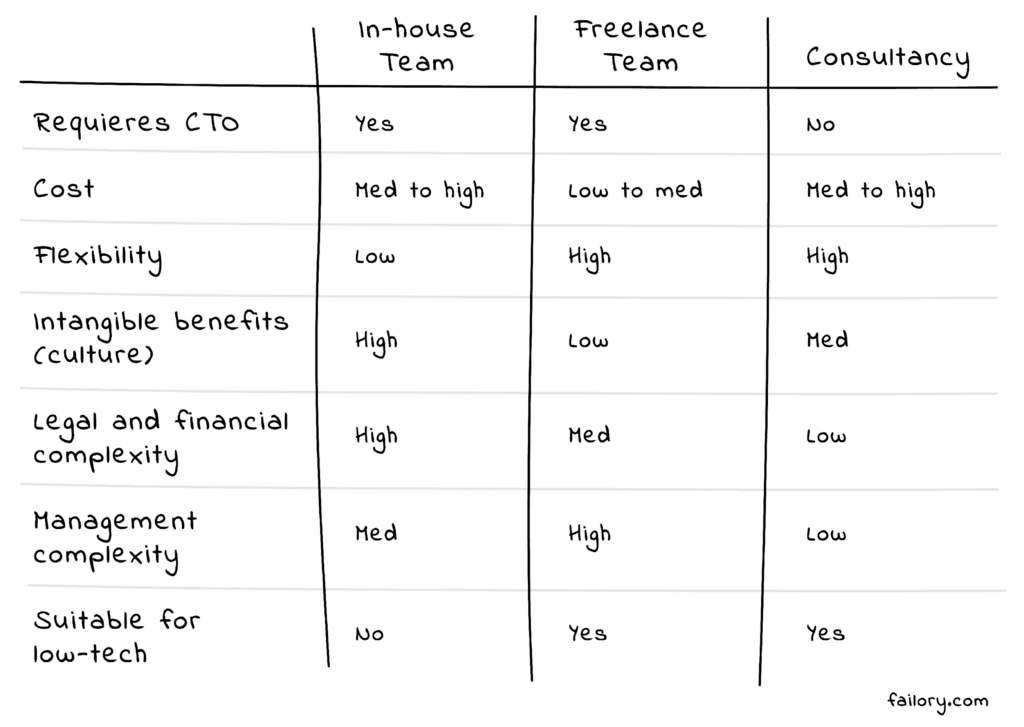Before a startup is able to raise capital, it has two main assets in its very early stages. The first one is the idea it’s trying to realize. The second one is the startup team which has to implement it. Which asset do you think is more important and ultimately – valuable?
“If you go to VC firms with a brilliant idea that you’ll tell them about if they sign a nondisclosure agreement, most will tell you to get lost. That shows how much a mere idea is worth. The market price is less than the inconvenience of signing an NDA.” – Paul Graham
There is a simple reason for this – reality is very complex, and when the tires meet the road purely theoretical ideas usually fall apart. Hence, they have very little value.
In this post, you will find insights about building a startup team from idea to growth, including key recruiting channels.
- The early-stage startup team: Find proactive, entrepreneurial people. Motivate them with a mix of fixed and flexible pay. Think about which roles are critical for your project, and which could be outsourced.
- The growth stage startup team: Consider the pros and cons of building a large in-house team versus outsourcing most of the heavy-lifting for your startup. Culture vs flexibility.
- Where to Find startup talent: Don’t just rely on recruiting sites. Use social media and your own network, online research, online communities, and local startup and tech meetups to find like-minded people excited by high-risk, high-reward, innovative professional opportunities.
Any startup idea undergoes many transformations before it manages to find meaningful traction. It’s not a coincidence that idea validation and the lean startup principles as a whole are an industry standard. The idea you start with is not very important, but it’s vital that you iterate fast and in the right direction in order to end up with a better, reality-tested version of your idea before you run out of resources.
The factor that ultimately determines if you are able to execute is the capability of the people working on the idea. Hence, almost all of the value of your early-stage startup is concentrated in your startup team. You can afford to make a mistake regarding your idea (in fact, it’s almost impossible to be right the first time), but team mistakes are much more costly. Internal conflict, team members that don’t pull their own weight for any reason like lack of skill or motivation, or unaligned goals and values could all be fatal for the startup project.
Good people can fix bad ideas, but good ideas can’t save bad people.
1. The Early-Stage Startup Team
In the idea stage, you are looking to test and iterate on your idea as quickly as possible. You usually do that by running validation tests and gathering customer feedback.
Once you’ve selected the idea that gave you the best validation results, it’s time to build the first version of the core product, test it against the market, and iterate based on market feedback until you find a good product-market fit.
This is usually a long and hard process and there is no blueprint on how to do it. In order to be successful, the people involved in the project need to be proactive, knowledgeable, and unafraid to experiment and fail.
According to Firstround, teams of two or more founders outperform solo founders by 163%. Moreover, solo founders get 25% lower seed valuations.
This startup statistic isn’t very surprising – almost any investment fund would tell you that they try to avoid single-founder startups mostly because they want to avoid having a single point of failure.
The idea stage is all about challenging and testing your assumptions. It helps a great deal to have other people actively involved in your startup not just because it lessens the workload, but because if they have the right qualities, they can challenge bad ideas and offer better solutions.
Because of this, the most important qualities to look for in your co-founders or early hires are:
- Proactivity: An entrepreneurial disposition is the no. 1 quality that you need in your early-stage startup team. You don’t need “yes” men, you want people who can think critically, generate and challenge ideas, and who are comfortable taking the initiative to implement and test them. The early-stage startup team needs a sense of urgency because your success is highly dependent on the velocity with which you can generate, test, and iterate on ideas.
- Domain and technical knowledge: It’s a cliché that each startup needs a hustler and a hacker, a.k.a. a marketer and a technical expert. Domain knowledge and technical skill are key, otherwise discovering real problems in the market and building a viable solution is unlikely. Bear in mind that not all startups need an equal amount of marketing and technical knowledge. According to Firsround, enterprise startups with a technical cofounder outperform non-technical startup teams by 230%. However, this is not true for consumer companies, where technical teams underperform by 31%.
1. 1 Hiring During The Early Startup Phase
Getting a brand new idea off the ground is not a task that a single person can manage. This means that in order to be successful, you need to involve other people in the project – to build your startup team. First and foremost, those would be your co-founders. However, if you have access to capital, hiring full or part-time team members is the way to go.
Usually, in order to attract the right kind of people, first you need talents that believe in the business and its potential. Without this shared passion, no amount of money will push the team to their full potential. Second, motivation correlates with compensation, whether it is a fixed payment, equity or both. Although, beware of distributing equity too soon as you risk selling your startup short. Furthermore, you can fire a team member but you can’t fire a co-founder, in case you don’t find a fit.
Having a team member who doesn’t pull their own weight (and more) in the early stages could easily kill the business, so pick the early team members extremely carefully. Using a testing period before committing to a hire is an effective approach in the early stages. Stay true to the hire slow, fire fast mantra. Your team is going to be small, so every member determines your success to a large degree.
A bad hire could truly sink the ship – not only are they a significant cost in the early stage of the project, but bad teamwork and communication can damage the productivity of your other team members as well. Keep in mind that 23% of startups blame team issues for their failure, and team problems are the second most common kind of problem in startups.
1.2 Critical Startup Team Members
- Founder & CEO: The main driving force behind the business and the person responsible for the high-level strategy. The leader of the early-stage startup team needs to have good domain knowledge combined with a decent grasp of the specificities of running a small, innovative, high-risk project. The project management needs to be lean and agile, rather than rigid and hierarchical as in most big companies.
- Marketing and Sales (e.g. CMO): Along with the CEO, this is the main person responsible for taking the product to potential customers. Bear in mind that talking to customers as a whole is the most critical activity in the early life of the startup. In very small team, this role is fulfilled by everyone, rather than just the marketing and sales person. That said, even in bigger teams the founder must be involved. The people making the decisions need to have direct contact with the customers in the early stages.
- CTO: The main person responsible for actually building the solution. Some startups don’t necessarily require a technical person in the founding team. That said, once you start building the first testable version of the product, if you don’t have a technical founder, you’d usually have to hire a CTO. No-code solutions are becoming better and better, but as the project grows in complexity, technical competency becomes key.
- More Engineers (software and/or hardware developers): if your startup is not highly technically complex, you’d rarely need more than one person to do the tech work. If it is, however, developers become much more important. That said, hiring a full-time in-house development team is not always the right solution. Developers are expensive, and full-time employees increase the risk that you’d run into liquidity issues. It’s a fully viable alternative to outsource the development process to a freelance team (if you have a CTO to manage the freelancers!) or to a software consultancy company (if you don’t).
1.3 Non-critical Full-Time Startup Team Members
- Legal: There’s usually not enough legal work early on to justify a full-time team member solely responsible for the legal side of the project (of course, this depends on the industry). Outsourcing is the logical step – either a freelancer or a legal agency with startup experience would usually address your needs.
- Finance and Accounting: The same applies to a full-time CFO. Outsourcing all of the financial and accounting work to an accounting firm or freelancer with experience in the startup field will usually be enough in the early stages.
- Human Resources: While hiring at the early stage is critical, you are unlikely to make more than a few hires. Usually, the founding team is the one who attracts, selects, and evaluates any additional team members. Of course, involving a recruitment agency to help you find more candidates is not a bad idea, if you are looking for candidates with specific backgrounds and set of skills.
2. The Growth Stage Startup Team
After validating your ideas and building a successful startup product that is gaining traction, your company will search for a repeatable, sustainable, and scalable business model. Once it finds it – it will enter the growth stage. The focus of the company moves away from experimentation towards providing at scale the products/services which have shown the most promise.
During the growth stage, your experimental, innovative startup graduates into a real business.
Naturally, fast growth requires a larger team. This means that you’d need to hire more people to help with the essential functions of the business (usually marketing, sales, and development). Moreover, you could decide to involve secondary functions in your team. For example, a CFO who is responsible for fundraising (and other forms of financing) could take away a big burden from the shoulders of the CEO and allow them to focus most of their attention on running and growing the business.
2.1 In-house Startup Team vs Outsourcing
There is a decision you need to make – to keep your in-house team small, and to outsource most activities to stay lean and flexible, or to build a larger in-house team in order to reap intangible benefits – better corporate culture, intrapreneurship, etc.
There are pros and cons to both approaches, but with remote teams getting more and more popular after 2020, relying on freelance teams or whole consultancies to do most of the heavy lifting is clearly where the future of work is headed. The biggest benefit of this approach is that in case you have unreliable and volatile cash flows you can cut costs very fast. Here’s a quick summary of how each hiring group compares with respect to technical leadership, cost, flexibility, culture, legality, and technical suitability.

3. Where To Find Startup Talent
Your very early founding team will likely come from your own network. The reason is that working in an early-stage startup is a big commitment, and people are unlikely to do it just for equity if they don’t have previous experience with the person they are partnering up with.
If you’re able to afford funding the early stages of your startup, however, you can start using other routes to find team members.
- Social Media: LinkedIn is a great way to find people that wouldn’t be a total cold call. Make a post that you are looking for a specific kind of person, and let your connections do the work and recommend good people they could vouch for! Local Facebook groups could also be useful to find people interested in high-risk high-reward opportunities.
- Online Research: Google is also an important starting point when searching for team members (or researching people you’ve already found!). If you find people with the right kind of experience, don’t hesitate to reach out! Most cold calls (or more commonly emails) would get ignored, but the ones that yield results could change the trajectory of your startup project.
- Freelance Marketplaces: Upwork, Guru, TopTal, etc. If you are trying to build a remote, freelance team, this could be the easiest way to do it. There are also marketplaces specialized in specific skills – design, virtual assistance, content, and more.
- Recruiters and Job Agencies can do a decent job, but it’s better if they have experience with startups so that they understand the needs of your project better. Moreover, a recruiter can help you evaluate your potential future team members.
- Local Meetups: Startup events in your city/country could be an incredible place to network and to find people interested in startups. If you are looking specifically for developers, you can also try hackathons, tech conferences, etc.
- Online Communities: GitHub for tech people, relevant subreddits, etc. The problem with this is that you are less likely to find local people, so you should be comfortable with remote work.
- Clutch.co: If you are looking for a consultancy to take over a part of your business, Clutch is a great start to see what companies could be the best possible fit.
Conclusion
The success of your startup idea depends almost entirely on the capability of your startup team. In fact, a great entrepreneurial team can turn an OK idea into a great one. Try to be flexible in the way you build the team – don’t just think about full-time employees, but consider co-founders and partners, freelancers, consultancies, etc.
Involving the right people in your project is critical, so make sure not to underestimate this part of the startup journey and to find, vet, and involve the right people.





